
For the first time in two years we'll have an orthodox, full-length NBA season to look forward to. No lockout nonsense, and precious little obsession as to whether or not LeBron James will ever win the big one. He's won it, already, and our sanity as NBA followers is probably better off as a result. However big that shred of sanity is remains to be seen, following yet another offseason that once again proved that the NBA is full of Crazy McCrazytons that appear to take great delight in messing with us continually.
As a result of that offseason, and the impending regular season, why not mess with Ball Don't Lie's triptych of Kelly Dwyer, Dan Devine and Eric Freeman as they preview the 2012-13 season with alacrity, good cheer, and bad jokes.
We continue with the stylishly outfitted Cleveland Cavaliers.
Kelly Dwyer's Kilt-Straightener
The Cleveland Cavaliers, once again, are a farm team. But unlike the one that put up with LeBron James' growing pains and hanger-on demands before he skirted off to Miami, this one is essentially acting as a growing field for whatever the team's front office decides will come next. The team's rotation is almost entirely filled with players on rookie scale contracts, and while a good chunk of those youngsters won't bowl you over, they have enough star guard Kyrie Irving to make up for any misgivings you might have about two-through-12.
Irving is an unabashed star. You could probably score on him in a pick and roll, and he doesn't have John Stockton's career assists record shaking in its mid-cut sneakers, but the kid is an All-Star level scorer and game-changer. Because he shot so well and scored in so many different types of ways during his rookie season, you don't fear the sort of stagnation that hampered John Wall's disappointing second season; or, to a far lesser extent, Derrick Rose's second season. To work that smoothly which such little help as a teenager while turning in the sort of rookie season he managed in 2011-12? You might want to make Cleveland one of your five League Pass selections this year.
The other youngsters have a lot of explainin' to do, though.
Tristian Thompson produced well on the glass in his rookie year last season, but he seemed awkward and ill at ease at times in ways that seemed to go beyond the usual rookie hesitancy. Perhaps switching out the horrid defense of Antawn Jamison with the well-intentioned floposity of Anderson Varejao will aid in his development, but for now it looks like the Cavs used a high lottery pick on someone who could end up as a rebounding enthusiast to bring off the bench.
Dion Waiters? We've waited all summer on making too-early declarations about the guy based solely on his summer camp play or offseason training habits, so it wouldn't be wise to leave that policy behind when he's a few weeks away from making his own declarative statements on the court. His hole is already pretty deep, though — Cavs fans are anxious for this rebuilding to bear some fruit, and drafting a sixth man from a team that isn't the Kentucky Wildcats is a tough sell.
The easy sell? Look at the guy. This dude could turn out to be one of the toughest guards dem guards are charged with guarding.
From there? The double-A team, which even includes rookie big man Tyler Zeller. All manner of youngsters — from vets like Omri Casspi and C.J. Miles to fringier League Pass sensations like Jon Leuer and Alonzo Gee — that the team will have 82 games and loads of practice anecdotes to work with while they decide to decline or pick up options in the coming years.
Leading them all, and carping about those practice habits, will be Byron Scott. Scott has a very poor reputation as a leader of youth; it's true that self-starters like David West and Richard Jefferson have improved under his watch, but the difference between a good coach and great leader is the ability to pull great things out of someone like, say, Dion Waiters. Should we be predicting the next two years of Cleveland's fortunes based on the fact that J.R. Smith's father is a real piece of work? Probably not, but Scott has some proving to do that goes well beyond his ability to improve a young team's defense and make sure its homework is turned in on time.
This is a two-year plan, by the way. Next summer the Cavs will have six (six!) qualifying offers to decide upon, as well as a spate of expiring contracts and loads of cap space. They're going to have to pounce and pounce hard in order to give something to Kyrie Irving to want to come to work with, and pull it off way better than Danny Ferry did after LeBron James' second season in 2005. Even with that hometown discount in hand, you'll recall, LeBron only signed a limited extension.
Until then, mild growth. Nothing to sell to season ticket-holders, but you tend not to care about such things when Kyrie Irving gets to suit up for 82 games between October and late April.
Projected record: 34-48

Fear Itself with Dan Devine
It is tonally appropriate that the NBA season tips off just before Halloween -- because on any given night, each and every one of the league's 30 teams can look downright frightening. Sometimes, that means your favorite team will act as their opposition's personal Freddy Krueger; sometimes, you will be the one suffering through the living nightmare. In preparation for Opening Night, BDL's Dan Devine considers what makes your team scary and what should make you scared.
What Makes You Scary: Kyrie Irving. The 19-year-old No. 1 overall draft pick and new Cleveland cornerstone responded to post-draft concern (including some from me, in our '11-'12 Cavs preview) that his 11-game college cameo at Duke had not adequately prepared him for the rigors of running point at the NBA level by promptly beginning to kick the league's ass, scoring 20 or more in seven of his first 12 games to lead Cleveland to a surprising 6-6 mark out of the gate. But while the young, relatively talent-poor and overwhelmed Cavs soon cooled and stumbled to the league's third-worst record, Irving kept up his stellar play. He finished the season averaging 18.5 points, 5.4 assists and 3.7 rebounds per game in 51 appearances -- Rookie of the Year-winning numbers that sound good on their own, but look even better in context.
According to Basketball-Reference.com, only seven other players in NBA history have put up equal or better averages in their rookie seasons: Oscar Robertson, Michael Jordan, LeBron James, Allen Iverson, Damon Stoudemire, Tyreke Evans and former Phoenix Suns big man Alvan Adams. All seven played more than 33 minutes per game as rooks, though; Irving averaged just 30.5. Pop his pace-adjusted numbers -- 21.8 points, 6.4 assists, 4.4 rebounds per 36 minutes of floor time -- into the Player Finder, and it's just the kid and the Big O, which isn't bad company to be in.
Irving was accurate, too, shooting 46.9 percent from the field, 39.9 percent from 3-point land and 87.2 percent from the line on the season. Only 36 players in NBA history (who have attempted at least 50 3-pointers, which helps control somewhat for guys that went 1-for-2 from deep or played short minutes) have matched those splits over a full year; among them, Irving was the only rookie. If he repeats that performance just once more during his career, he'll become one of 15 players to post multiple such seasons, joining elite shooters like Ray Allen, Larry Bird, Jeff Hornacek, Reggie Miller, Chris Mullin, Steve Nash, Dirk Nowitzki, Mark Price and Peja Stojakovic. Which, again, isn't bad company to be in.
And while the Cavs weren't very good in close games -- they went 10-20 in contests in which they were tied or within five points of the lead with five minutes left, according to NBA.com's stat tool -- Irving was sensational when it counted. According to 82games.com's tracking, the rookie led the NBA in scoring during "clutch" time (defined by the site as "4th quarter or overtime, less than 5 minutes left, neither team ahead by more than 5 points") with a staggering average of 56.4 points per 48 minutes of "clutch" play on 54.4/66.7/89 shooting splits. You name your favorite late-game killer and Kyrie outpaced him. The rest of the top five: Kevin Durant, Carmelo Anthony, Russell Westbrook, Chris Paul. Again: Not bad company to be in.
So yes, Irving is good; more to the point, after leading the Select Team charge to beat the eventual gold medalists from Team USA during a pre-Summer Olympics scrimmage, he knows it. (Why else do you think he's so eager to take Kobe 1-on-1?) He's not all the way there -- we'd like to see that 1.74-to-1 assist-to-turnover ratio get up above 2-to-1, and to crib a thought our Fearless Leader used in discussing Rajon Rondo during our Boston Celtics preview, it's hard to be considered the best point guard in the biz when you run the fourth least-efficient offense in the league -- but he's really close for a point guard after just one season.
There are only a handful of players whose mere presence on a roster makes a team a near-lock for a playoff berth virtually irrespective of the talent that surrounds them -- James, Paul, Dwight Howard, maybe Durant, maybe Wade, maybe Kobe. (Not that any of them have to go it alone anymore, natch.) I don't expect the Cavs to achieve their goal of making the playoffs this year -- there's just not enough talent or depth on the roster to make big enough leaps on either side of the ball to bridge the gap between a 26-win pace and the eighth seed. If they prove me wrong, though, I am convinced it will be because Irving has entered that group. Not bad company to be in, and pretty damn impressive to get there during a season that begins before he can legally drink.
What Should Make You Scared: That defense, again. NBA.com's stat tool, Hoopdata and Basketball-Reference all had Cleveland ranked 26th among 30 NBA teams in defensive efficiency last season; Synergy Sports Technology's play-tracking data actually thinks that's a bit high, pegging the Cavs as last year's third-worst defense in terms of points allowed per possession. In fact, Synergy's got Cleveland as the league's worst team at defending spot-up shots, third-worst at guarding the ball-handler in pick-and-roll situations and second-worst at guarding the roll man, third-worst at checking dudes off cuts, and among the league's 10 worst on isolations, post-ups and preventing scoring off screens and offensive rebounds. (Weirdly, they ranked second-best in transition defense. Maybe the answer for Cleveland is to crank up that middle-of-the-league pace and turn every game into a track meet.)
A full (well, maybe full) season of Anderson Varejao, back from the broken right wrist he suffered in March, should help organize and solidify Cleveland's opposition. But it's not like 30-year-old post-injury Andy can be expected to impact the defense like Dwight Howard, Kevin Garnett or Tyson Chandler would; more pieces are needed. No. 4 overall pick Dion Waiters excelled as a disruptive defender in Syracuse's 2-3 zone and could help on the perimeter, but what Cleveland could really use is a major defensive step from second-year forward Tristan Thompson.
The Texas product has length and athleticism for days, but posted relatively low block and steal rates, and failed to translate his gifts on the offensive glass (where he grabbed a higher share of available rebounds than noted board-crashers DeMarcus Cousins, Joakim Noah and Marcus Camby) to the defensive end (where his 16.8 percent defensive rebound rate ranked as well below average among NBA power forwards and centers). If he can't pair with Varejao to form a stronger defensive front line, Cleveland will again have a really hard time slowing opposing offenses ... and if Jonas Valanciunas, who was still on the board when the Cavs chose Thompson at No. 4 in the 2011 NBA draft, winds up being a defensive force for the Toronto Raptors in his first NBA season, it might get a little hot under the collars of Thompson, coach Byron Scott and general manager Chris Grant.

Eric Freeman's Identity Crisis
There is no more important asset for a basketball team than talent, and yet the more loaded squad does not always win. What we've seen in recent seasons isn't only that the best team wins, but that the group with the clearest sense of self, from management down through the players, prevails. A team must not only be talented, but sure of its goals, present and future, and the best methods of obtaining them. Most NBA teams have trouble with their identity. Eric Freeman's Identity Crisis is a window into those struggles, the accomplishment of realizing a coherent identity, and the pitfalls of believing these issues to be solved.
For their first post-LeBron season, the Cavs — via the astonishing actions of owner Dan Gilbert — became the NBA's loudest spurned lovers. It was not terribly attractive, an unhealthy combination of desperation and self-righteousness. Luckily for us, it was short-lived, in large part because of Kyrie Irving. The Cavs point guard is a genuinely electrifying talent: able to get into lane as adeptly as anyone in the NBA, agile in the open floor, explosive in tight spaces, etc. Assuming he improves at the expected rate, he'll lead Cleveland back to the postseason and farther away from their unfortunate past.
In other words, they will continue to define themselves positively rather than as an organization in opposition to, essentially, a void at the center of the franchise. The Cavs, to their credit, seem to have realized that complaining about one man is no way to creep back towards respectability, especially now that LeBron has become more popular than he was when the wounds of The Decision hadn't yet been cauterized.
It's necessary, too, because this Cavs team should be a lot of fun. Irving is the main draw, clearly, but watching Tristan Thompson and Dion Waiters come into their own could be thrilling, too. Our job, insofar as we have one at all, is not to saddle this group with the weight of proving past Cavs wrong. They are not in moral opposition to the past — they're simply another kind of fun basketball team. Let them breathe.
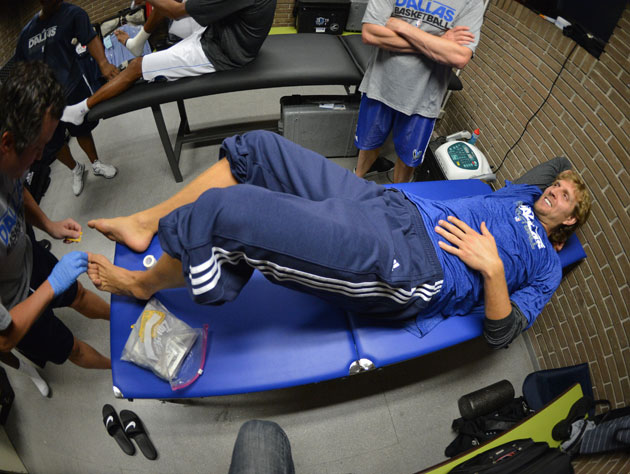


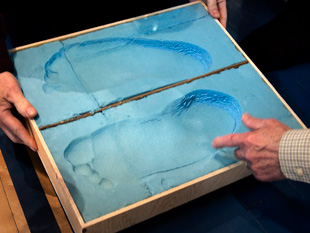 Thursday's delivery came at the end of a process that began more than five months ago, around the time of Vovkovinskiy's Target Center visit. He'd been looking for solutions to his footwear problems for years, since his condition began affecting the size of his feet to the point where he required surgeries, the recovery from which necessitated bed rest, which he told Rodrique Ngowi of The Associated Press has left him largely homebound for years:
Thursday's delivery came at the end of a process that began more than five months ago, around the time of Vovkovinskiy's Target Center visit. He'd been looking for solutions to his footwear problems for years, since his condition began affecting the size of his feet to the point where he required surgeries, the recovery from which necessitated bed rest, which he told Rodrique Ngowi of The Associated Press has left him largely homebound for years: Seeking a solution, Vovkovinskiy started a Facebook fundraising campaign to try to get enough cash together for the shoes; after word of his plight spread via social media, news reports and television coverage, donations flooded in, giving him double the necessary amount and even resulting in footwear maker Reebok offering to offer to set him up for free. They flew him from Minnesota to their Canton, Mass., offices in May, scanned his unique feet and created custom molds for the sneakers, then covered the cost of producing the one-of-a-kind items.
Seeking a solution, Vovkovinskiy started a Facebook fundraising campaign to try to get enough cash together for the shoes; after word of his plight spread via social media, news reports and television coverage, donations flooded in, giving him double the necessary amount and even resulting in footwear maker Reebok offering to offer to set him up for free. They flew him from Minnesota to their Canton, Mass., offices in May, scanned his unique feet and created custom molds for the sneakers, then covered the cost of producing the one-of-a-kind items.


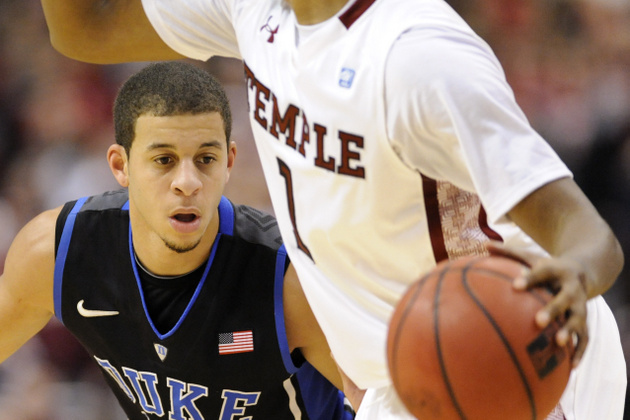
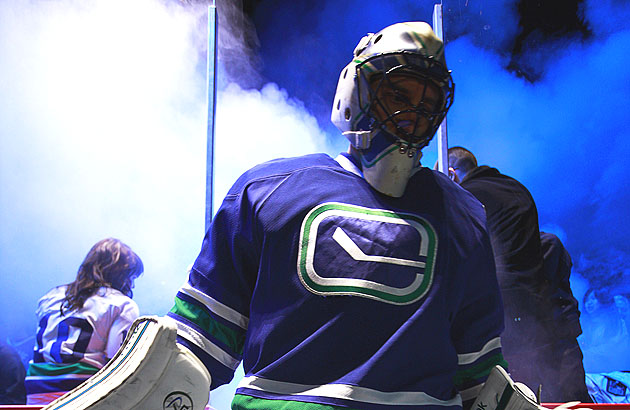
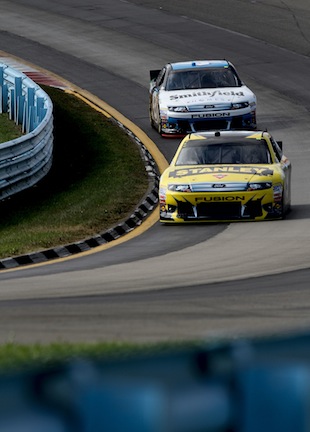 KANSAS CITY, Kan. -- Richard Petty Motorsports announced Friday that it will stay with Ford for the 2013 season.
KANSAS CITY, Kan. -- Richard Petty Motorsports announced Friday that it will stay with Ford for the 2013 season.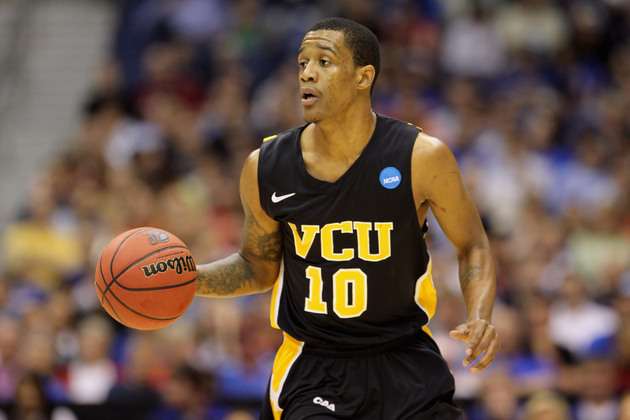
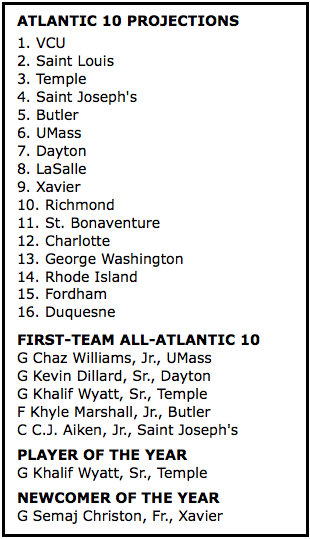 If the ACC is basketball's biggest conference realignment winner because of the additions of Syracuse, Pittsburgh and Notre Dame, then the revamped Atlantic 10 certainly isn't too far behind.
If the ACC is basketball's biggest conference realignment winner because of the additions of Syracuse, Pittsburgh and Notre Dame, then the revamped Atlantic 10 certainly isn't too far behind.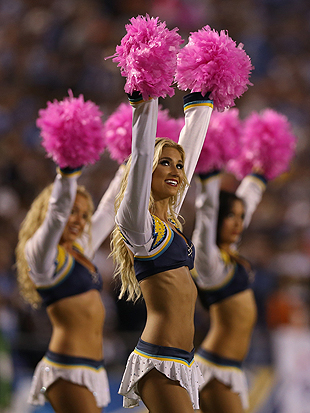 Let's be perfectly honest about one thing: No official website for any team in any sport is going to be truly objective. The primary goals of team sites are to get the fans pumped up and to sell merchandise, sometimes with the benefit of access that other media outlets are not given. That's the nature of the beast these days, and everyone understands it. Still, there's a level of professionalism required, and for the most part exhibited, by those official mouthpieces.
Let's be perfectly honest about one thing: No official website for any team in any sport is going to be truly objective. The primary goals of team sites are to get the fans pumped up and to sell merchandise, sometimes with the benefit of access that other media outlets are not given. That's the nature of the beast these days, and everyone understands it. Still, there's a level of professionalism required, and for the most part exhibited, by those official mouthpieces.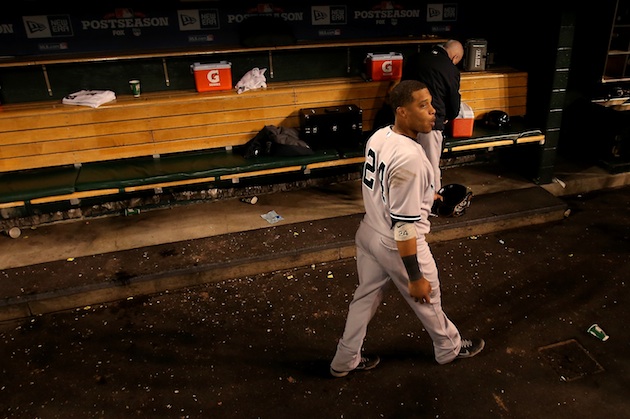
 "There is only one team that's going to be happy when the year ends," Girardi told reporters when they asked what he said to his team after the 8-1 loss in Game 4. "They did a lot of good things and they overcame a lot of good things this year. We know we fell short. We understand that.
"There is only one team that's going to be happy when the year ends," Girardi told reporters when they asked what he said to his team after the 8-1 loss in Game 4. "They did a lot of good things and they overcame a lot of good things this year. We know we fell short. We understand that.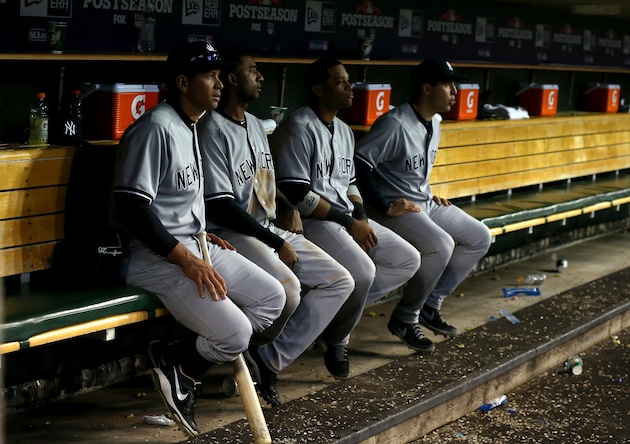
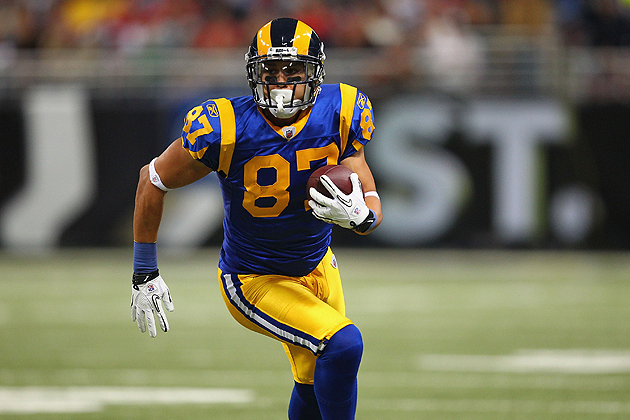
Recent Comments